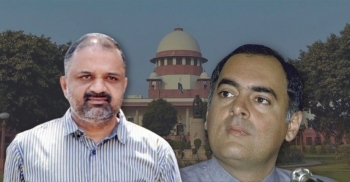
.png) Joseph Maliakan
Joseph Maliakan

Periavalan was arrested on 11 June 1991 at the age of 19. His crime: Bought two nine-volt golden power cells for Sivarasan, the Liberation Tigers of Tamil Elam (LTTE) man who masterminded the conspiracy to assassinate former Prime Minister Rajiv Gandhi. The cells were used in the bomb that killed Rajiv Gandhi at Sriperumpadur in Tamil Nadu on 21 May 1991.
Perarivalan was sentenced to death by a Terrorists And Disruptive Activities (Prevention) Act (TADA) Court in 1998, which was upheld by the Supreme Court in 1999. In August 2011, the Madras High Court stayed the execution order. Around this time, Perarivalan’s mother Ammal started building a nationwide movement against death penalty visiting prisons across the country with a badge pinned on her saree, Marana Thandnai Ozhipom (Abolish Capital Punishment). On 18 February 2014 the death sentence was commuted to life imprisonment by the Supreme Court.
The case in the apex court was part of a 2015 remission plea submitted by Perarivalan to the Tamil Nadu Governor, seeking release under Article 161 of the Constitution. On not getting any response from the Governor, Perarivalan had moved the Supreme Court.
On 18 May 2022, Perarivalan was “set at liberty forthwith” by the Supreme Court after 31 years in prison, using its extraordinary powers “for doing complete justice” under Article 142 of the Constitution. Perarivalan had pleaded for release in accordance with the recommendation made by the Tamil Nadu government in September 2018. The Governor sat on the recommendation for two-and-a-half years before sending it to President Ram Nath Kovind in February 2021 who also sat on it.
On 18th May, the Supreme Court ruled that it is “well settled that the advice of the State Cabinet is binding on the Governor in the exercise of his powers (to grant pardons, reprieves, respites or remissions) under Article 161 of the Constitution”, and that the “non-exercise of his powers under Article 161 or inexplicable delay in exercise of such power not attributable to the prisoner is subject to judicial review.”
The SC order also pointed out “the reference of the recommendation of the Tamil Nadu Cabinet by the Governor to the President of India two-and-a-half years after such recommendation had been made is without any constitutional backing and is inimical to the scheme of our Constitution.”
In fact, the Governor came under severe criticism by the Madras High Court in July 2020. The HC brought to the notice of the Governor that no time limit had been prescribed for the constitutional authority to decide on such issues only “because of the faith and trust attached to the constitutional post. “If such authority fails to take a decision in a reasonable time, then the court will be constrained to interfere.”
The SC Bench of Justices L. Nageswara Rao, B.R. Gawai and A.S. Bopana also disapproved of the Tamil Nadu Governor sending to the President the recommendation of the State Cabinet to remit the remaining part of the convict’s sentence. The Bench refused to accept the Union Government’s argument that the appropriate government to decide the remission of sentence is the Union Government.
Where both the State and the Union had the power to make laws, the Union government’s power will take precedence only if executive power had been expressly conferred on the Union under the Constitution or the law made by the Parliament, failing which the executive power of the State remained intact.
The Bench also said that in so far as offences under section 302 IPC are concerned, in the absence of any specific provision under the Constitution or under any law made by the Parliament expressly conferring executive power on the Union, the executive power of the State would extend, irrespective of whether the subject matter of section 302 is considered to be covered by an entry in the concurrent list.
On 9 March this year, the Supreme Court had granted bail to Perarivalan taking into account the fact that he had spent three decades in jail. In his struggle to get freedom, Perarivalan had the support of two former Supreme Court judges.
Former Supreme Court Judge V.R. Krishna Iyer, with whom Perarivalan was in touch with until Iyer’s death, wrote in 2006: “His soul is precious, his values noble, his jail life has not made him a criminal.”
Justice K. T. Thomas who headed the SC Bench that confirmed the death sentence to Perarivalan in 1999 raised the issue of ‘double jeopardy’ in the case in 2013. Justice Thomas stated that hanging the convicts 23 years after conviction would be unconstitutional. That led to the SC commuting the death sentences of three convicts in 2014.
Perarivalan had written in his book “An Appeal from the Death Row” (2006) that he was implicated on the basis of a confession taken under duress, and asks why a probe did not try to find out where the bomb was made. Following his conviction in 1999 Perarivalan consistently maintained that he was innocent. In fact, IPS officer V. Thyagarajan who interrogated Perarivalan revealed in 2013 that Perarivalan had stated that he had purchased the cells but did not know to what use they would be put to.